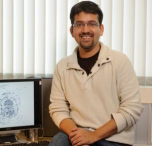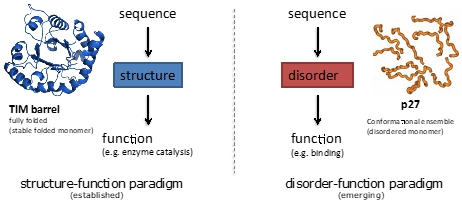ISCB Innovator Award Keynote
M. Madan Babu
 Programme Leader, MRC Laboratory of Molecular Biology,
Programme Leader, MRC Laboratory of Molecular Biology,
Cambridge, United Kingdom
http://mbgroup.mrc-lmb.cam.ac.uk/
https://www2.mrc-lmb.cam.ac.uk/group-leaders/a-to-g/m-madan-babu/
Presentation Title: How Does Protein Disorder Enable Phenotypic Diversity?
Time: Monday July 9, 8:30 am - 9:30 am
Room: Grand Ballroom C-F
2016 marked the launch of the ISCB Innovator Award, which is given to a leading scientist who is within a decade and half of receiving her or his PhD degree, and has consistently made outstanding contributions to the field and continues to forge new directions. M. Madan Babu is the 2018 winner of the ISCB Innovator Award.
Abstract:
Understanding how the amino acid sequence of a protein contributes to its function (sequence–function relationship) is a fundamental problem of long standing interest. In the 1960s, Christian Anfinsen postulated that the amino acid sequence of a protein determines its three-dimensional structure that in turn determines its function. This work laid the foundation for the sequence–structure–function paradigm. However, a class of polypeptide segments called intrinsically disordered regions does not conform to this postulate. In this presentation, I will first describe established and emerging ideas about how disordered regions contribute to protein function. I will then discuss molecular principles by which regulatory mechanisms, such as alternative splicing and asymmetric localization of transcripts that encode disordered regions, can increase the functional versatility of proteins. I will also present IDR-Screen, which is a high-throughput experimental and computational approach for discovering functional disordered regions in a biologically relevant context and identifying features of functional sequences through statistical learning. Finally, I will discuss how disordered regions contribute to human disease and the emergence of cellular complexity during organismal evolution.

Biography:
M. Madan Babu is a Group Leader at the MRC Laboratory of Molecular Biology, Cambridge, UK. He obtained his undergraduate degree in 2001 from the Centre for Biotechnology, Anna University, India with fellowships from the Indian Institute of Science and the Indian Academy of Sciences. He then received an LMB-Cambridge International Fellowship and a Trinity College Research Scholarship to carry out his doctoral research at the Medical Research Council’s Laboratory of Molecular Biology (MRC-LMB) in Cambridge, UK.
Babu’s research group aims to gain a detailed understanding of how regulation is achieved at distinct levels of organization in cellular systems by placing a particular emphasis on understanding how the precise structure and intrinsically disordered regions of proteins contribute to cellular regulation. Specifically, he investigates regulation at three levels of organization: molecules, processes and genomes. At the molecular level, Babu aims to discover novel features of regulatory and signalling proteins. At the process level, he aims to understand how the different regulatory mechanisms contribute to cellular homeostasis. At the genome level, he studies the interplay between regulation and genome evolution.
Babu's work has also been recognized with national and international awards including the most recent Blavatnik Awards Life Sciences Laureate (2018), Francis Crick Medal and Lecture from the Royal Society (2015), Protein Society Young Investigator Award (2014), Lister Prize (2014), Biochemical Society of UK’s Colworth Medal (2013), Royal Society of Chemistry’s Molecular BioSystems Award (2011), British Genetics Society’s Balfour Award (2011), and the EMBO Young Investigator Award (2010). Madan is an executive editor of Nucleic Acids Research, an elected member of EMBO (2016) and a Fellow of the Royal Society of Chemistry (2017)
